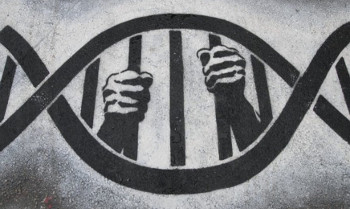https://www.cnn.com/2018/07/16/us/cold-case-april-tinsley-dna-trnd/index.html
https://geneticliteracyproject.org/2018/06/01/what-the-search-for-the-golden-state-killer-means-for-public-dna-databases-and-law-enforcement/
(Image from the Genetic Literacy Project)
April Tinsley was a beautiful girl who’s life was cut short in the most horrific manner, there’s no doubt about it. “What would you do, what would you sacrifice, to solve this case and find her killer?” – her parents would surely say “anything”, no matter what the cost, and I can’t disagree with that.
The case is solved now, and the cost is for all to see. This isn’t about debating whether it’s appropriate to use the DNA data available, that decision was made for us. This article is about the cost to us all. In the end, a national DNA database already exists and is in active use. I’m not referring to CODIS or the FBI’s DNA database, that was an effort already under way and they DNA profiled convicted felons – I’m referring to what happens when private business gives protected health information to law enforcement and other governing bodies without discussion.
- To quote Halifax privacy lawyer David Fraser, “This is some of the most sensitive information that exists”.
- There has been no discussion as to when it’s appropriate to access this information, we’re all just reading about it in the news. Is a warrant necessary? Who else knows about the inquiry and how is that medical information shared? Who’s family tree was traversed in an investigation that found nothing versus those we read about paraded on the front pages? It’s not that the answers aren’t available, it’s that they’re kept from the general public, for law enforcement eyes only. No discussion and no policies/procedures is not “we the people”, it’s “police state”.
- Contrary to what we’re led to believe, DNA is not foolproof. “His DNA was at the scene” does not mean “guilty”, but once DNA is invoked people equate it with “case closed”. People were near Trump protests but did not participate, they were still jailed. Look at what happened to Amanda Knox – of course she handled the communal kitchen knife but did she commit murder with it? If these people we’re putting away for cold cases don’t confess, we have hard evidence that’s still potentially circumstantial.
- Citizens had no idea that their genetic information would be available to law enforcement at any level when they signed up for any genetic service, ever. All their agreements/policies read is “by a third party”, allowing people to assume it’s a third party lab, geneticist not hired by 23andme.com (or the like), etcetera. If the privacy policies read in bold print “all global law enforcement agencies will gain access to your genetic information without due process”, how many people would sign up and how much blowback would there be? We know the answer, and this is why we weren’t asked.
- The Affordable Care Act is being crippled, hamstrung, sabotaged until preexisting conditions and other extortionate limitations return. That breast cancer research program you participated in? Three years from now you’ll be denied health coverage. Who’s the criminal now?
Amanda Knox said in her interview, “Either I’m the horrible, heartless monster that I’m made out to be, or I’m just like you.” Rights and governance don’t protect the innocent or condemn the guilty, they provide structure to do both. Eliminating our rights to find the guilty makes us all vulnerable to being “guilty” next week by those in power.
I am glad that this and other cold cases were solved, truly, and I understand the anguish parents feel when their families are ravaged, but the price for closure is paid by everyone for better and worse. This needs to be understood and discussed.
This goes well beyond any and every citizen and straight to our government and law enforcement. Who you vote for matters. If someone believes “it takes broken eggs to make an omelette” (one wrongful prosecution is worth ten righteous convictions) or believes s/he has the moral authority to make medical decisions for you, that person has no place in governance.
After that, all we can do is read the fine print and make careful account privacy selections, then hope our government doesn’t abuse the material we give private companies.


